|
|
|
Sort Order |
|
|
|
Items / Page
|
|
|
|
|
|
|
| Srl | Item |
| 1 |
ID:
193384


|
|
|
|
|
| Summary/Abstract |
The ancient knowledge system was reported to be excellent, indicating India’s both societal and personal requirements. It had a clear goal and a clear objective. The ancient Indian knowledge system, in which the mind itself served as the fundamental subject of education, accorded the thinking principle of Manan Shakti the ultimate priority. The ancient knowledge system was evolving in relation to the process of thinking crucial for acquiring knowledge, according to the ancient Indian knowledge system. Over thousands of years, India developed a rich and diversified body of knowledge in fields including philosophy, mathematics, economics, and medicine.
|
|
|
|
|
|
|
|
|
|
|
|
|
|
|
|
| 2 |
ID:
193374
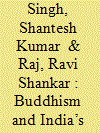

|
|
|
|
|
| Summary/Abstract |
The phenomenon of soft power has garnered greater attention within the field of international relations, setting it apart from conventional hard power instruments, such as military might and economic power. In light of the ongoing evolution of the geopolitical environment, it is evident that governments are progressively using soft power as a means of exerting international influence in conjunction with hard power. India, where Buddhism originated, has been progressively using its soft power to acquire strategic benefits and cultivate closer relationships with surrounding nations and beyond.
|
|
|
|
|
|
|
|
|
|
|
|
|
|
|
|
| 3 |
ID:
193377


|
|
|
|
|
| Summary/Abstract |
The Modi-led government is placing a strong accent on the use of soft power in India’s foreign policy. One of the more novel manifestations of these initiatives has been engagement in Buddhist diplomacy. The Buddhist faith, due to its emphasis on peaceful co-existence and its wide pan-Asian presence, lends itself well to soft-power diplomacy. This brief will examine India’s attempts at leveraging its historical and present-day associations with the faith, alongside similar attempts by the Chinese state.
|
|
|
|
|
|
|
|
|
|
|
|
|
|
|
|
| 4 |
ID:
193368
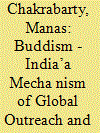

|
|
|
|
|
| Summary/Abstract |
At the conclusion it should be stated that with regard to Buddhist diplomacy, it is necessary on the part of the Indian government to do much more in the arena of tangible results. Undoubtedly, there have been significant developments in areas like Buddhist tourism, the successful rehabilitation of Nalanda University, and India’s safe homage to the Dalai Lama over the years. However, the present government is effectively handling critical issue in the execution of the policies.
|
|
|
|
|
|
|
|
|
|
|
|
|
|
|
|
| 5 |
ID:
193372
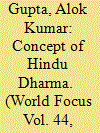

|
|
|
|
|
| Summary/Abstract |
Dharma as a concept is unfathomable, and that is the beauty and gravity of the term. Its meaning depends on the context in which it is used. One may equate the term with kindred words like: duties, rights, conduct, behaviour, morality, righteousness, religion, goodness, justice, laws, virtue, right to rule, to name a few; yet its meaning is all encompassing but incomplete. It should rather be understood in terms of harmonious achievement of different aspects and needs of one’s life which may include artha, kama, moksha, yet it is nowhere to be related or limited with the meaning of religion.
|
|
|
|
|
|
|
|
|
|
|
|
|
|
|
|
| 6 |
ID:
193366
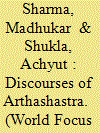

|
|
|
|
|
| Summary/Abstract |
Kautilya is considered as the founder of political thinking in Indiantradition, he focused on all aspects of the statecraft as public administration, military establishment, foreign affairs, monetary and fiscal policy and social welfare etc. He was considered as the realist thinker of Indian knowledge system, who focused on administration compared to the religious wellbeing, although his thoughts has various references from previous thinkers particularly from Manu and Brihaspati, but his discourses are much clear and distinct focusing uponthe statecraft.
|
|
|
|
|
|
|
|
|
|
|
|
|
|
|
|
| 7 |
ID:
193382


|
|
|
|
|
| Summary/Abstract |
With a diverse history dating back thousands of years, India has nurtured a tapestry of cultures, religions, languages, and artistic expressions. This unity in diversity has been a driving force in fostering harmony and resilience within the country. India’s ancient civilization, exemplified by the Indus Valley Civilization, provides valuable insights into the development of human civilization. India’s spiritual and philosophical traditions, including Hinduism, Buddhism, Jainism, and Sikhism, have not only influenced the country but have also had a profound impact on global thought and spirituality.
|
|
|
|
|
|
|
|
|
|
|
|
|
|
|
|
| 8 |
ID:
193375


|
|
|
|
|
| Summary/Abstract |
he Indian culture gives great importance to literary art. India has witnessed some great poets who have changed the way of looking towards life of the people. Indian culture also has a huge contribution of its classical music. The great dramas and movies reflect the Indian society and its culture.Culture has two types: (i) material, and (ii) non-material. The first includes technologies, instruments, material goods, consumer goods, household design and architecture, modes of production, trade, commerce, welfare and other social activities.
|
|
|
|
|
|
|
|
|
|
|
|
|
|
|
|
| 9 |
ID:
193367


|
|
|
|
|
| Summary/Abstract |
When treated with insolence by someone, Khwaja Saheb would consider it a divine reprimand for something that had gone wrong. He believed in self-control and self-criticism as the best methods of reducing tension in the society. He would always find something wrong with him when people would do wrong to him.
|
|
|
|
|
|
|
|
|
|
|
|
|
|
|
|
| 10 |
ID:
193385


|
|
|
|
|
| Summary/Abstract |
These efforts have been taken up to strengthen and enrich Indian languages and to aware the students with the richness and vastness of cultural heritage of BHARAT, enthusing and acquainting them the ethnology they have been distant with hitherto so that they must be cognizant and informed of the folklore that’s been theirs. Also they can prosper and master in the spirit of ours tradition and customs which is no less in competence. Educating them with the morals and ethics of the native literary texts which explains the lavishness and affluence of our popular knowledge that has fascinated the world.
|
|
|
|
|
|
|
|
|
|
|
|
|
|
|
|
| 11 |
ID:
193369


|
|
|
|
|
| Summary/Abstract |
It has been along held view that the west is the mother of democracy and all other modern values. This view of even promoted to justify the unethical and illegal colonial rule of centuries. Now India has come to claim that India not the West is the mother of democracy. India’s claim is more sustainable when we adopt a broader meaning of democracy. Democracy is not a form of government, but a way of life.
|
|
|
|
|
|
|
|
|
|
|
|
|
|
|
|
| 12 |
ID:
193383


|
|
|
|
|
| Summary/Abstract |
Karma Yoga is not a compulsion but a necessity of the present world because people in homes, offices, administrative positions and even high positions are suffering mentally only because of their ambitions or because of cravings, they are always stressed. He is not dedicated to his duty but is only concerned about his material happiness. The current global environment should not be a matter of concern but should be reflective and for this, all government and non-government organizations should join hands and work together so that a world of healthy minds can be created.
|
|
|
|
|
|
|
|
|
|
|
|
|
|
|
|
| 13 |
ID:
193370


|
|
|
|
|
| Summary/Abstract |
Temples in India are not just places of worship rather a telling saga of India’s rich cultural heritage, scientific and architectural marvel. The Sun temple at Konark is one such engineering marvel located on the bank of river Chandrabhaga facing the endless Bay of Bengal within few metres was constructed during the reign of Narasinghadeva – I of eastern Ganga dynasty in 13th century AD. Also called Black Pagoda of Odisha, this temple is dedicated to Lord Sun. Shaped like a giant chariot, the temple is known for its exquisite stone carvings that cover the entire structure with a an architectural set up of magnets.
|
|
|
|
|
|
|
|
|
|
|
|
|
|
|
|
| 14 |
ID:
193378


|
|
|
|
|
| Summary/Abstract |
Mahabharata in Sanskrit literally means ‘the great India’. Mahabharata is not just an epic, a story or a historical incident, but a way of life and the basis of Indian spirituality since times immemorial. This paper is an attempt to discover the influence of Mahabharata on the South-East Asian countries.A nuanced attempt shall be made in this paper to assess and highlight the role of Mahabharata as an instrument of Soft power in Indian Foreign policy.
|
|
|
|
|
|
|
|
|
|
|
|
|
|
|
|
| 15 |
ID:
193381


|
|
|
|
|
| Summary/Abstract |
The tradition of preserving revered saints’ bodies in Hindu temples, exemplified by the preservation of Ramanujacharya’s body in the Sri Ranganathaswamy Temple in Srirangam, Tamil Nadu, showcases India’s deep spiritual and cultural heritage. This tradition, spanning over eight centuries, is rooted in spirituality, devotion, and the enduring connection between the saint and his followers. Unlike the elaborate preserving of Egyptian mummies, Ramanujacharya’s preservation employs natural elements like sandalwood and saffron, emphasizing his spiritual presence. This practice holds profound significance, symbolizing continuity, pilgrimage, cultural heritage, and unity within the Hindu community.
|
|
|
|
|
|
|
|
|
|
|
|
|
|
|
|
| 16 |
ID:
193373


|
|
|
|
|
| Summary/Abstract |
State is considered as the primary political and social institution for the governance of the people of a definite territory whereas republic has been considered as the most ancient form of democratic polity. Although, both the concepts of state and republic have been traced to the western literature yet an unbiased reflection of history provides a vivid impression of statehood existing in ancient India with a republican spirit.
|
|
|
|
|
|
|
|
|
|
|
|
|
|
|
|
| 17 |
ID:
193386


|
|
|
|
|
| Summary/Abstract |
The Bhadrakali Temple/ Devastanam in Warangal is three hours by road from Hyderabad, which is home to Shaktism, the temple was built in 625 AD by King Pulakesin ll of Chalukya dynasty,about 1398 years ago as gratitude to Ammavaru Bhadrakali for a war victory, the region which later came under the reign of Kakatiya rulers, who made Ammavaru Bhadrakali as their Tutelary Deity/ Kula Devatha and fixed the rare Bhadrakali/ Kohinoor diamond that was mined in the Kollur mines , as the third eye on the forehead of Ammavaru Bhadrakali.
|
|
|
|
|
|
|
|
|
|
|
|
|
|
|
|
| 18 |
ID:
193376


|
|
|
|
|
| Summary/Abstract |
Yoga has had a significant influence on almost all aspects of modern world consciousness over the past 2,500 years. Modern life style of people has an impact on their physical, mental, and social well-being.There is a need to raise awareness of the implications of modern living in order to reduce the adverse consequences of lifestyle decisions.
|
|
|
|
|
|
|
|
|
|
|
|
|
|
|
|
| 19 |
ID:
193379
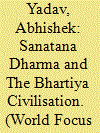

|
|
|
|
|
| Summary/Abstract |
On 3rd September 2023, speaking at a conference on ‘Eradicating Sanatana Dharma From the Society’, in Tamil Nadu, Udhayanidhi Stalin, the Grandson of Tamil Nadu’s longest serving Chief Minister M. Karunanidhi and Son of present day Chief Minister of the state M.K. Stalin, triggered a new political storm with his remarks on Sanatana Dharma. Saying, “The conference’s title is apt. I appreciate them for calling for the eradication of Sanatana and not merely opposing it. For instance, mosquitoes, Dengue, Malaria, and Corona, we should eradicate these, and not just oppose. Likewise, Sanatana should also be eradicated from the society. It is not enough if we merely oppose it.”, the third generation DMK scion sparked a new controversy. The statement by Udhayanidhi Stalin, started a new debate around the Sanatana Dharma and its linkage with the Bhartiya Civilisation.
|
|
|
|
|
|
|
|
|
|
|
|
|
|
|
|
| 20 |
ID:
193380


|
|
|
|
|
| Summary/Abstract |
It is time for us all to realize our true Self and move on a spiritual path, within. It is the time to Shrimat Bhagwad Gita helps us to see the larger cosmic picture, our location in the cosmos, and the path uniquely suitable and provided to us. For over 5,000 years now and for times immemorial Shrimat Bhagwad Gita will continue to help every old soul on the path to resolve the issues and help becoming conflict free, leading to move with the spiritual revolution 5.0.
|
|
|
|
|
|
|
|
|
|
|
|
|
|
|
|
|
|
|
|
|